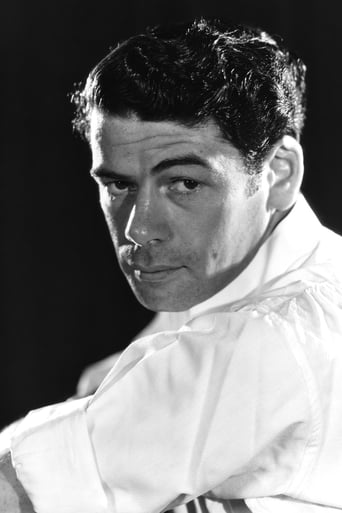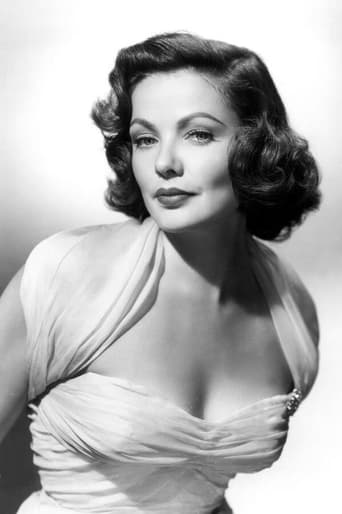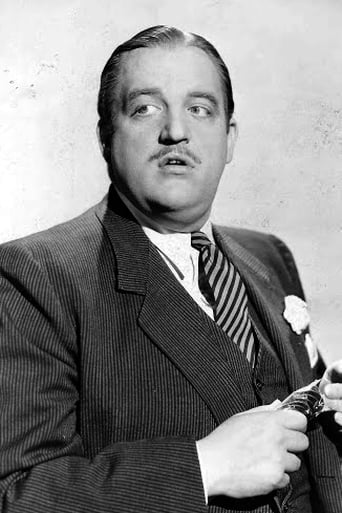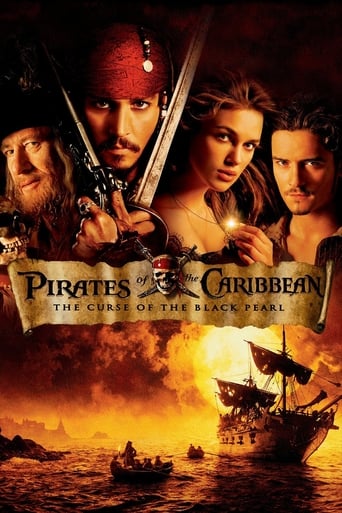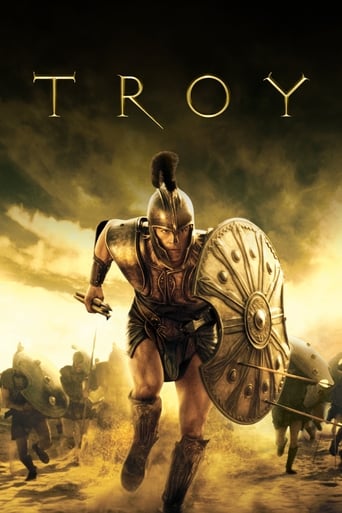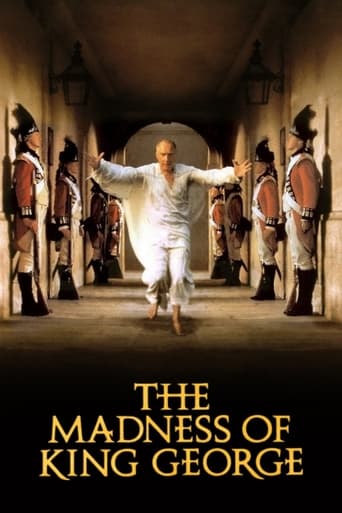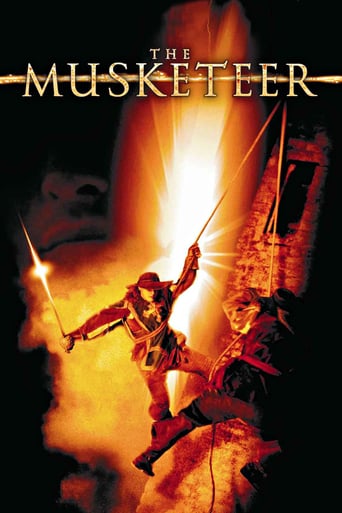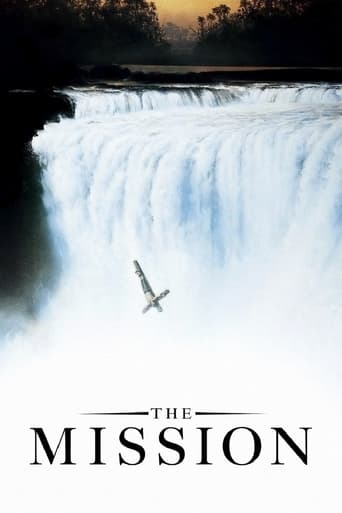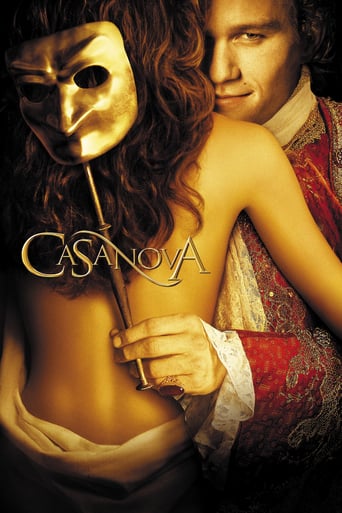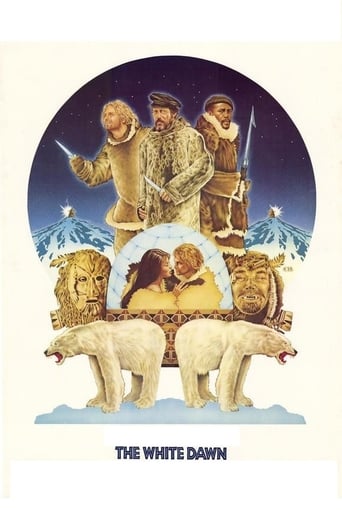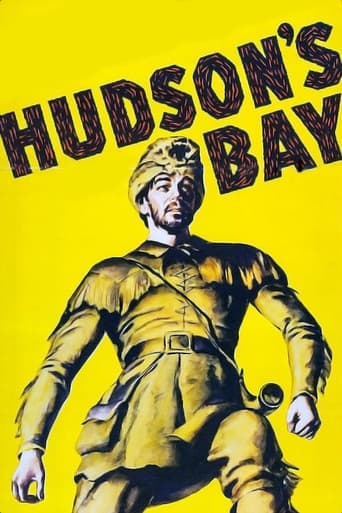
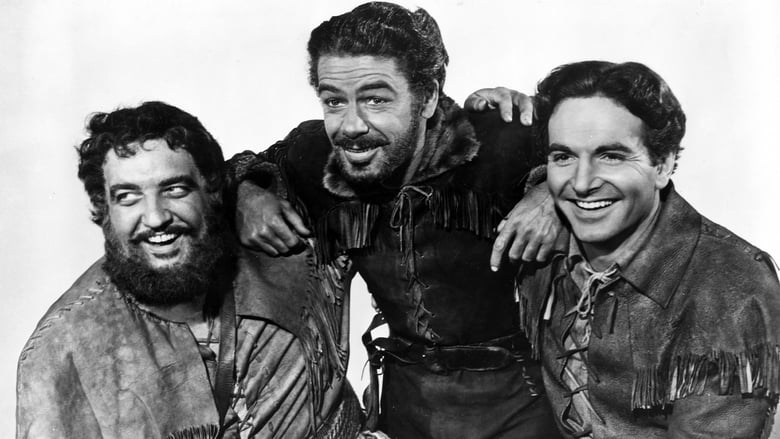
Hudson's Bay (1941)
Highly fictionalized early history of Canada. Trapper/explorer Radisson imagines an empire around Hudson's Bay. He befriends the Indians, fights the French, and convinces King Charles II to sponsor an expedition of conquest.
Watch Trailer
Cast
Similar titles

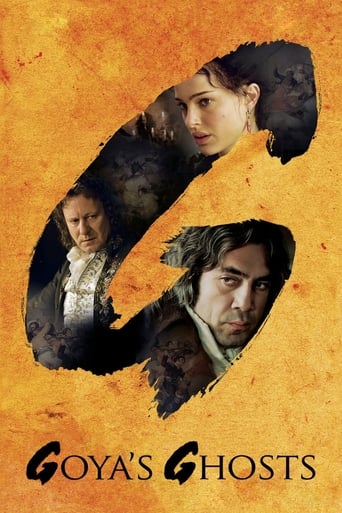
Reviews
Fantastic!
Don't listen to the Hype. It's awful
This is a tender, generous movie that likes its characters and presents them as real people, full of flaws and strengths.
At first rather annoying in its heavy emphasis on reenactments, this movie ultimately proves fascinating, simply because the complicated, highly dramatic tale it tells still almost defies belief.
First of all, I tracked down this film because of the cast. This film boasts Vincent Price, Gene Tierney, Paul Muni, and Nigel Bruce, which sounds like a great treat. Unfortunately, the film fails them. You can see each of them struggling to bring this movie to life with each line they deliver, but it just isn't enough. Although I was happy to see these stars, the film in its entirety isn't worth watching for most.The film tells the story of an Englishman from the courts of King Charles II, who is exiled to Canada, and meets up with fur traders in jail. He bands together with them to hatch a scheme that will get him back in good standing with the king and his friends back home. This involves a lot of hard work, and some meddling in their business by the French government in Canada who want their cut of the money. They find their way to England and explain to the king what their idea is. Eventually, he agrees to their plans, although there are still some squabbles and fights along the way. I wont tell how it ends, but it isn't hard to tell whether or not they succeed.As you may have guessed by my description, this is a fictionalized account of the history of fur traders. If you aren't interested in Canadian, Indian, or American history of this time period, or maybe even if you are, this is going to be a boring movie to watch. Many times, there are scenes of exposition to explain what was going on in history at the time. Either that, or characters sit around and talk for a long time about laws, rules, and their future plans. There just isn't enough action for a film that is supposed to have adventure as well as history. The only reason why I didn't give this film a lower score was the actors. They really tried their hardest. Even those who played the Indians and the French gave better performances than they needed to. I was happy to see that each nation was represented fairly as well. Other films around this time period might not have shown as much respect, or would have used stereotypical behavior. So, that was a plus.Overall, it isn't one of the worst historical adventure films I have seen. It certainly isn't a good one either, unfortunately. Because it is stuck in that limbo of 'just okay' films, it's been forgotten about by audiences for a long time. I'm not saying that this is a forgotten gem we need to resurrect, but if you are a die hard fan of these actors, like me, you should check it out if you can.
Should have been titled 'Hudson's Bay Company', since that is the main point of the film. Not a film about the discovery of the bay by Henry Hudson: another epic story.Paul Muni was born to play Louis Pasteur, Emile Zola, Benito Juarez, and, in the present film, Pierre Raddison, in partial biographical treatments. Spending his early life in eastern Europe, his family emigrated to NYC, where he came to shine in the local Yiddish theater, before being tapped by Hollywood in the early talky period. His roles mostly involved serious dramas, with little comic content. Thus, he must have enjoyed making the present film, in which he portrays a very bombastic, but often fun-loving, Radisson. No other actor could have come close to his portrayal, with constantly rolling fiery eyes, to help get his points across in serious or jestful moods. It's doubtful if the real Radisson had near this degree of charisma, but it's fun for the audience to imagine that he did. Muni largely carries this film, although some fine supporting actors help. Laird Cregar, all 300 lbs. of him, plays Muni's constant sidekick: Mr. Gooseberry, who is based on Radisson's real brother in law: Medard des Groseilliers(master of the gooseberries, in English translation). Although Cregar largely serves as Muni's enforcer and comic foil in the film, Groseilliers was probably equally important to Radisson in importance in leading to the establishment of the Hudson's Bay Company. Radisson gets more credit probably because he wrote up many of their experiences, not always accurately. Cregar would have a short Hollywood career, mostly playing sinister villains, including Jack the Ripper. Again, Mr. Gooseberry must have been his most fun role. He would die young a few years later, shortly after stomach surgery, necessitated by the consequences of an extreme crash diet initiated in an effort to avoid being further type-cast as a heavy heavy.John Sutton, who plays the fictional romantic lead, with much screen time, was a real life adventurer, born in British India, traveling much of the world, doing odd jobs, before landing in Hollywood. He would often be cast in swashbuckler roles in the '40s.. A very young Gene Tierney is the fictional female romantic lead, although her screen time was very limited. Vincent Price is well cast as King Charles II, and Virginia Field as his real life mistress: Neil Gwyn.Some aspects of the plot have reasonable historical accuracy. Radisson lived a while with the Mohawks, after being captured, escaped to Albany, NY, and eventually returned to New France via Europe, where he teamed up with Groseilliers on a fur trapping expedition to the Lake Superior region. Their furs were confiscated on a technicality,upon returning to Montreal, which instigated their seeking alliance with British financial backers. Radisson did have great rapport with most of the relevant Native American tribes, partly because of his insistence that they be fairly compensated for the furs they brought to the trading posts. This gave him great leverage in his demands upon his financial backers, as portrayed in the film. The film doesn't deal with the many later complications this pair of Frenchmen had in their relations with the Hudson's Bay region, and their complicated back and forth relations with the French and British crowns, which sometimes were officially at war with each other. Rather, in good Hollywood tradition for these times, the plot ends on a tidy note, in which all the principals seemingly get what they want, after resolving the complicated crisis created by the news that Tierney's (fictional) brother had been executed for disobeying Radisson's strict order to avoid giving the Native Americans alcoholic drinks.A few further notes.The plot suggests that Radisson and Mr. Gooseberry had no wives, being 'married' to the pristine Canadian wilderness. In fact, they both had wives at times. Radisson was 20 years younger than the middle-aged to elderly Groseilliers during their long association. In contrast, Muni was nearly 20 years older than Cregar, although the audience, no doubt, would be surprised to learn this.
Fox continued their run of pioneering biopics (that is to say, depicting the life stories of notable historical figures as opposed to the films themselves being particularly groundbreaking!) by recruiting the actor who had been most renowned for this type of fare, i.e. Paul Muni, albeit at another studio (Warners). In fact, Fox had earlier made LLOYD'S OF London (1936), SUEZ (1938), STANLEY AND LIVINGSTONE (1939) and THE STORY OF Alexander GRAHAM BELL (1939) in this vein, whereas Muni had starred in THE STORY OF LOUIS PASTEUR (1936), THE LIFE OF EMILE ZOLA (1937) and JUAREZ (1939). Though HUDSON'S BAY more or less maintained the standard of both parallel cycles, it proved to be Muni's last such vehicle.Anyway, this revolves around French fur-trapper Pierre Esprit Radisson's opening-up of Canada (at the time mostly populated by Red Indians and referred to as "New France") to do business with Europe and his dream of giving an identity to the still-untamed country. Muni (who actually looks quite a bit like director Pichel, himself an imposing character actor with a somewhat sinister countenance and a distinctive deep voice to match!) was once considered the greatest thespian of his generation, but his hammy acting style – rendered even more ludicrous by a variety of 'funny' accents – has dated badly in hindsight. Mind you, he is still a compelling screen presence and, in this case, he comes across as something of a man of action (whereas he had usually been restricted to presiding over laboratory flasks, books – of both literature and law – and the political arena in defence of the oppressed)! Typically, the production values and supporting cast are impressive: the latter includes Laird Cregar as Muni's equally uncouth sidekick; Gene Tierney (wasted in a smallish part – despite being second-billed – as the obligatory romantic interest of John Sutton, yet another of the protagonist's companions!); Vincent Price as the British King Charles II (to whom Radisson turns – thanks to banished subject Sutton's influence – when his request of an official Canadian expedition to the rightful French ruler falls on deaf ears and, having ventured forth solo, his prized pelts were subsequently appropriated by the State and himself thrown into prison!); and Nigel Bruce as an aristocrat (who, persuaded as to the benefits that could be reaped by England from the establishment of a Hudson Bay trading-post, vouches for Muni with His Majesty).Radisson emerges here a man who is able to elicit confidence from the savage people he deals with but, more importantly, he respects them in return – even making it a point to get to know them (so that he can then react accordingly to their unpredictable nature). For one thing, he notices the Redskins cannot withstand alcohol, and that its intake yields unbridled violence – when such an episode occurs, he does the right thing and condemns the man responsible to death by firing squad (even if, being Tierney's layabout brother, he is the prospective in-law of Muni's own pal Sutton!). This form of instant justice is not appreciated by Price (by the way, the King's infamous mistress Nell Gwynn, also puts in an appearance here: for the record, I recently acquired but have yet to watch her own 1934 biopic with Anna Neagle and Cedric Hardwicke as her sovereign lover) on their return, but eventually both he and Tierney resign themselves to the fact that Radisson acted in the best interest of all concerned.
He's the goofy Quebecois trapper speaking with an accent, that's who. With World War Two raging in Europe, Great Britain was trying to make sure that the French-speaking Quebecois didn't decide to throw another revolution, which is why Laurence Olivier played one in 49TH PARALLEL. Nothing loath, Warner Brothers, not quite knowing how to deal with its acknowledged Great Actor, Paul Muni, who liked nothing better than to disappear into a bushy beard and an accent, cut a deal with Zanuck at Fox for him to appear in this film, in which he appears in a short beard. Which made him very hard to offer as a star and he would make one more war-based picture next year, playing a clean-shaven Norwegian, before disappearing from the screen for a few years. What the heck: George Tobias was cheaper for all-purpose ethnics.Anyway, this is a pretty amusing picture, if you don't take any of it seriously. The cinematography, co-credited to George Barnes, is very handsome. Muni plays the role for laughs, the roles are filled out with leading character actors and the soundtrack skips between 'Aupres de ma Blonde' and 'Oh, Canada.' Good enough.
